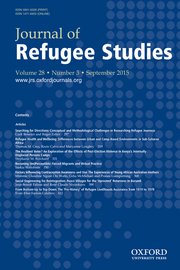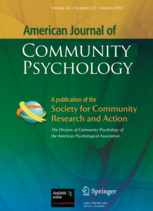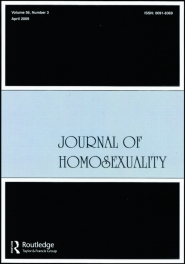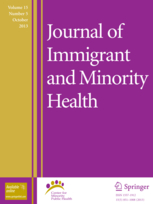February 2017:
Issue 5.5
In this Issue:
LGBTQ Immigrants and Intersectionality in the U.S.
Current News & Announcements
Brittney McNamara
January 13, 2017
Teen Vogue
Jeremy Hobson
June 13, 2016
NPR
Kari Lindberg
December 8, 2016
Queens Chronicle
Julie Moroeau
December 27, 2016
NBC News
Stephanie Bai
May 18, 2016
NBC News
Frances Kai-Hwa Wang
June 13, 2016
NBC News
Kate Santich
November 14, 2016
Orlando Sentinel
Christian Portilla
October 4, 2016
Miami Herald
Rebecca Toledo
June 17, 2016
Telesur
Sunnyvie Brydum
June 27, 2014
The Advocate
Upcoming Events
Cambridge, MA
25 February, 2017
Sydney, Australia
29-31 March, 2017
Atlanta, GA
19-21 April, 2017
Raleigh, NC
21-22 April, 2017
San Francisco, CA
7-8 June, 2017
|
|
|
 COMMENTARY COMMENTARY
The William's Institute Study at UCLA Law School (See more) provided a clear snapshot of a doubly vulnerable population that remains at risk in the current political climate of the United States. "There are approximately 267,000 LGBT-identified individuals among the adult undocumented immigrant population and an estimated 637,000 LGBT-identified individuals among the adult documented immigrant population. The report finds that approximately 71 percent of undocumented LGBT adults are Hispanic and 15 percent of undocumented LGBT adults are Asian or Pacific Islander" (Gates, 2013).
The Windsor Policy change of the Department of Homeland Security (
See more
) was a watershed moment regarding LGBTQ immigration. The New Yorker account of Windsor, "The Perfect Wife," makes a good summary (See more
) of the case but the implication for immigration had to be drawn by DHS. In this one change, the US opened the door for many same-sex married immigrant couples and allowed adjustment of status for tens of thousands more. In the MIPEX assessment of the US in comparison to 37 other nations, this one change helped improve the US immigrant integration standing from 11th to 9th
place worldwide. The US caught up with many other nations.
But after approvals and arrivals for some, and border crossing for others, integration is yet another battle. Ethnic communities generally hold onto the values of their countries of origin which may present a challenge to the minority member of that community who fled bigotry or worse
(See more).
For most, the course of action for LGBTQ immigrants is to seek connection with the LGBTQ community in the United States. Language and culture make this a complex journey. After experiencing suppression, self-identification--let alone social identification--is often a long process for LGBTQ immigrants. Finding security in the laws of the United States is primary. Finding welcome and acceptance of their identity demands unfamiliar trust of strangers. Furthermore, the LGBTQ community in the United States has been accused of ignoring intersectionality, thus leaving those who are LGBTQ
and
immigrants to sometimes feel unheard or unsupported even within LGBTQ spaces in the U.S.
(Balsam et al, 2011)
.
An environment of increased hostility in the United States toward both the LGBTQ and immigrant communities further complicates integration. On June 12th
, 2016, 49 Latinos, many of whom were immigrants or descendants of immigrants, were murdered in the Pulse Night Club on Latin Night. Furthermore, state policies such as North Carolina's HB2, which stripped LGBTQ persons from protections against discrimination in employment and allows employers, businesses, and even healthcare providers to discriminate against a person based on their sexual orientation, are a threat to LGBTQ immigrant integration. Many states, such as West Virginia, are threatening to pass similar legislation, and there are threats that a federal Religious Freedom Bill may be passed which will eliminate federal nondiscrimination protections.
Additionally, conversion therapy - an ineffective therapy that attempts to force a person into heterosexuality - is still legal in 45 states, including Massachusetts. In fact, Vice President Mike Pence has openly supported, and funded, conversion therapy programs.
It is important to recognize that recent attacks on immigrant rights are also attacks on LGBTQ rights. For example, the unconstitutional "Muslim Ban" puts LGBTQ Muslims fleeing persecution at greater risk for detention and deportation. Increased raids by Immigration and Customs Enforcement directly impact those who are both undocumented and queer (See the UndocuQueer Movement). President Trump's threat to reinstate Stop-and-Frisk policies on a national level will mean that more LGBTQ persons of color will be targeted by police violence, as we know that LGBTQ persons of color already experience the highest rates of police violence in the country. In fact, trans women of color are six times more likely to experience police violence. Trans persons are also at higher risk for maltreatment, abuse, and even death in immigrant detention facilities.
Social service agencies bear a notable responsibility at this intersection. It is often apparent that LGBTQ immigrants are isolated. Finding social supports to connect this population with like-ethnic community, as well as supports that encourage and strengthen their sense of self, will be a powerful tool toward integration and all the benefits of mobility, work and civic participation that can ensue. Those who work with LGBTQ immigrants can also utilize their voices as advocates for better policies that will protect the intersectional identities of LGBTQ immigrants.
Awareness of the growing networks described within this issue is a valuable resource for the social worker, clergy and educator who are often among the first trusted agents of the new homeland. Familiarity with cultural resources and services accelerates the journey toward wellbeing for the newcomer directed into friendly and supportive environments. Meanwhile ethnic networks take on an increasing role as advocates for their own diaspora, advocating for inclusivity and a recognition of past abuses back in the homeland so as to avoid those abuses being repeated here in the United States. Islamic societies or Latino clubs are expanding and the additional networking that these spaces provide within the diaspora for persons with similar sexual orientation and background becomes invaluable for initial socialization but also as a launch for full participation in the cultural and civic life of the community.
The Journal of Citizenship Studies
(Vol 18,14)
had one of the few studies on the intersection of sexual orientation and citizenship and noted the complexity of orientation in seeking US residency. However, the positive attachments fostered by connecting to a local network are evident. Little research exists on the variables of documented/undocumented immigrants, but the direction of study reinforces the critical role of the US in being a refuge and providing welcoming communities for those repressed in other nations.
Middle and high schools are a place of particular concern. Dual minorities, by nationality and sexual orientation, face particular risks. LGBTQ students are at greater risk for bullying and social ostracism from both classmates native to the United States and classmates from the immigrant student's native culture, as biases against LGBTQ persons occur in many cultures. Teens are at a crucial time in their identity formation, and this kind of ostracism can have deleterious effects on their physical and mental health. Just as with adults, fostering connections between adolescents and accepting communities is vital. Outreach by LGBTQ organizations that speak multiple languages is rare but can be of great assistance in integrating newcomers.
Fortunately, the Human Rights Campaign and local initiatives are increasing connections with progressive elements in the immigrant community as communities mobilize against the threat of an increasingly restrictive set of initiatives by the current US Administration. Community forums at universities working with civil rights groups can foster shared resources, joint action, the creation of missing services, and media attention to hold public systems accountable.
Fostering cultural awareness through the arts also has a powerful impact on self-identity and the perceptions of the receiving community. The
Limit(less)
project focuses on LGBTQ Africans in the diaspora using visual aesthetics to navigate their cultural, sexual and gender identities. Through photos and interviews with LGBTQ African immigrants, the documentary project hopes to, "deconstruct colonial notions that LGBTQ Africans are somehow 'un-African'" (Owunna, 2016).
Through agencies such as those highlighted, a small but growing body of scholarship, new alliances and effective human services, one can see evidence that intersectionality is leading to richer understanding and specialized efforts that in turn lead to a more inclusive, diverse America with support for all newcomers.
Westy Egmont, Director
BCSSW, Immigrant Integration Lab
Erica Camacho
BCSSW MSW Candidate '17
Balsam, K.F. (2011).
Measuring multiple minority stress: The LGBT people of color microaggressions scale.
Cultural Diversity and Ethnic Minority Psychology,
17(2), 163-174.
Gates, G.J. (2013). LGBT adult immigrants in the United States. The Williams Institute, UCLA School of Law. Retrieved from: http://williamsinstitute.law.ucla.edu/research/census-lgbt-demographics-studies/us-lgbt-immigrants-mar-2013/
Owunna, M. (2016). Limit(less). Retrieved from: http://limitlessafricans.com/
|
|
|
 AGENCY FOCUS
AGENCY FOCUS
Mariposas Sin Fronteras
is a Tucson, Arizona based group seeking to end the systemic violence and excessive abuse of LGBTQ peoples held in ICE detention centers in the United States. Mariposas' mission is to create a society which builds solutions outside of immigration detention centers and the prison industrial complex in the United States. Mariposas currently provides support to immigrants through letter writing, advocacy, visits, and housing services for individuals belonging to the detained LGBTQ community in Eloy and Florence, AZ. LGBTQ individuals experience high rates of systemic persecution and discrimination. Due to the intersectionality of oppression in the states, immigrants who are also LGBTQ are in dire need of support and solidarity. Our changing political climate calls for advocacy for the most at-risk populations, and Mariposas believes that the voices of the individuals directly oppressed by the systemic nature of detention centers and prisons must be heard. Through
testimonies
found on their website, Mariposas conveys the message of the individuals they support.
With many social justice oriented campaigns and projects on their current agenda, Mariposas Sin Fronteras promotes stories of LGBTQ individuals currently in detention centers while raising money through
GoFundMe campaigns
, using their website as a social platform. The projects conducted by Mariposas also include the "
Cocina de Mariposas: Comida Sin Fronteras
," an inclusive food initiative created to provide dignified work for individuals arriving in Tucson, AZ from detention centers and ICE occupation. The LGBTQ community is discriminated against for their sexual orientation and gender, and immigrants are discriminated against based on their language, race, and color of their skin. For these reasons, the Cocina works to create job equality and economic stability through self-determination and respect. The proceeds from the kitchen go back into Mariposa's campaigns to help support the LGBTQ immigrant community.
Queer Muslims of Boston
(QMOB) is a safe space for Queer Muslims residing in the Greater Boston area. Aiming to increase the visibility of Queer Muslims while maintaining a private and intimate gathering space, QMOB hosts monthly dinners and discussion meetings which are accessible through emailing
[email protected]
, or visiting their
Facebook
page. Regular social events, which are open to allies, include coffee meetings, concerts, and dancing. Their WordPress blog includes a list of
resources
for the LGBTQ community in Boston.
The Hispanic Black Gay Coalition
(HBGC) of Boston is a non-profit organizations focused on the intersectional needs of the Black, Hispanic, and Latinx LGBTQ community in Boston. Founded in 2009, the Coalition works to inspire and empower Latinx, Hispanic and Black LGBTQ individuals through activism, mental health counseling, education, and outreach. The Coalition has a vision to create spaces where Latinx and Black LGBTQ individuals can integrate and incorporate themselves into their racial/ethnic communities and the LGBTQ community at large. Due to the lack of resources and social services available for these individuals, the Coalition works to provide opportunities through working in solidarity with allies. With services such as
HIV Testing & Counseling
, and GSA (Gay-Straight Alliances) Development, the coalition works to engage the Latinx and Black LGBTQ community in tangible projects aimed at creating more inclusive communities. More information can be found by emailing
[email protected]
.
The
Queer Asian Pacific Islander Alliance
(QAPA) serves the New England Asian community by providing social, political, and educational support for LGBTQ individuals of Asian and Pacific Islander heritage residing in the Greater Boston area. Founded in 1979, the QAPA is the oldest organization for Asian queer individuals in the United States, and currently has over 300 members in the alliance. QAPA helps to host events such as the Quincy Lunar New Year Festival and the Boston Pride festival. QAPA welcomes all members, partners, and their allies at their events. They request that individuals interested in attending meetings join their
Meetup
platform to better expand their community outreach. More information can also be found on their
Facebook
page, including discussions about news, daily life, and political issues.
|
|
 CURRENT RESEARCH
CURRENT RESEARCH
|
|

|
Journal of Immigrant & Refugee Studies, 13(1), pp. 58-79.
Refugees and asylum-seekers greatly benefit from social support from family and coethnic community members upon resettlement. This is especially true for Muslim refugees who face religiously-motivated prejudice and violence in the United States. However, LGBT and other "gender role outlaw" Muslim refugees and asylum-seekers who have fled persecution abroad may be alienated from their families and communities due to their gender nonconformity. A study of 14 asylees who were "gender role outlaws" from predominantly Muslim countries was conducted to explore how gender nonconformity had impacted their social connections during the asylum process. The study also explored how "gender role outlaws" must sometimes integrate into the U.S. by performing according to Western norms related to homosexuality and female victimhood. Participants were shown to have experienced family alienation, tension or estrangement from their coethnic community, and a lack of affiliations with mainstream community members, including gay-affirmative communities. Other research has confirmed that these factors, combined with anti-Muslim bias and past trauma, can harm integration and mental health outcomes, risking long-term social isolation.
|
 |
Gray, N., Mendelsohn, D., & Omoto, A. (2015).
American Journal of Community Psychology, 55(1), pp. 202-214.
LGBT Latino/a immigrants struggle not only within ethnic communities, but also within majority white and mainstream LGBT populations. This decreases available sources of support. However, the intersectional nature of belonging to multiple communities also affords opportunities, and these immigrants receive varying levels of support from family and friends. A qualitative study of 13 LGBT Latino/a immigrants to the United States explored the risk and resilience factors among this stigmatized population. The results revealed 4 main themes. First, a majority of participants reported some level of connectedness to the LBGT community, although 8 participants noted feeling disconnected at times due to more extreme Western expectations for behavior, their LGBT identity not being central to them, discrimination, or because they perceived the community as largely white and privileged. Second, a majority of participants noted a strong connection to the Latino/a community, although 9 participants reported feelings of disconnection for reasons including the community's strong emphasis on Catholicism, discrimination, and gender-based expectations like machismo. Third, participants were aware of intersectional challenges in being a "minority within a minority." Fourth, a majority of participants displayed resilience and well-being, especially when receiving support from specific LGBT Latino/a immigrant communities.
|
 |
Persecution experiences and mental health of LGBT asylum seekers
Hopkinson, R.A., Keatley, E., Glaeser, E., Erickson-Schroth, L., Fattal, O., Sullivan, M.N. (2016).
Journal of Homosexuality, 32(2), pp.1-17.
There is a lack of research on the mental health and experiences of LGBT asylum seekers in the U.S. This study explores the experiences of 61 LGBT-identified asylum seekers who are seeking asylum because of their LGBT identity. The study also matched 35 of these participants with 35 non-LGBT participants of the same sex and country of origin who sought asylum for reasons unrelated to their sexual orientation. Findings show that LGBT asylum seekers experienced high rates of beatings, threats, slapping, kicking, punching, and blows with heavy objects. In addition, many experienced persecution from multiple perpetrators including their own family members. LGBT identified asylum seekers had higher rates of sexual violence, early childhood victimization, suicidality, and varying types of perpetrators compared to their non-LGBT identified asylum seekers. However, both groups did not show differences in rates of physical violence or length of detention. Clinicians and researchers should further explore addressing early childhood victimization for LGBT asylum seekers.
|
 |
Piwowarczyk, L., Fernandez, P., Sharma, A. (2016).
Journal of Immigrant and Minority Health
, 1(1), pp. 1-8.
The unique needs and challenges of LGB asylum seekers who disclose their sexual identity in the process of assimilating to their new host country are currently not addressed within the legal, psychological, and sociological reality of the United States. Fifty adults seeking asylum in the U.S. on the basis of their sexual orientation were interviewed about their experiences prior to immigrating to the U.S. Participants with partners reported that their significant others disappeared, were killed, detained, or committed suicide as a result of persecution for their sexual identity. Furthermore, participants reported that they were detained, arrested, physically attacked, tortured, forced to move, and ostracized by their community. Results show that women, compared to men, were more likely to move, experience rape or sexual assault, and experience threats while men were more likely to be physically attacked. In an attempt to change their sexual orientation, several LGB asylum seekers were forced into marriage, physically attacked by their family members, brought to mental health professionals, employed traditional healers, and were arrested by police authorities who tortured and beat them. The study suggests that health professionals and clinicians should provide a safe environment for LGB asylum seekers to disclose their sexual orientation and past history of trauma and torture.
|
|
 REVIEWS REVIEWS
Real Queer?: Sexual orientation and gender identity refugees in the Canadian refugee apparatus
By Murray, D.A.B.
Rowman & Littlefield International (2015)
For those claiming refugee or asylum status in Western nations due to persecution based on their gender identity or sexual orientation, the process is far from simple. In this ethnographic account of the Canadian refugee apparatus, Murray interviews individuals and observes the complex process of attempting to document or 'prove' one's gender identity and sexual orientation through the legal system. Murray's research examines both the heteronormative values inherent in the Canadian refugee process as well as the political motivations for offering entry to some LGBTQ refugees while systematically denying entry to others. Through a sensitive discussion of intersecting identities and the need to perform an 'authentic' queerness for the investigating nation-state, this account contributes to transnational scholarship on queer migration.
Queer migration politics: Activist rhetoric and coalitional possibilities
University of Illinois Press (2014)
The LGBTQ and immigration rights movements in the U.S. have not been as historically separate as many activists tend to believe. Chávez examines several crucial "coalitional moments" in which these two rights-based movements have converged around "shared concerns". By analyzing the intersectional identities of queer migrants - who are often marginalized because of their sexual orientation as well as their nationality - this study provides a frame of analysis for past and present social movements and the surrounding political rhetoric. Chávez's work offers insightful tools for intersectional activists, advocates, and scholars who are working to advance future cooperation between two interest groups that are both deeply invested in fighting for social and political change.
Terrorist assemblages: Homonationalism in queer times
Duke University Press (2007)
In this "path-breaking" theoretical work, Puar argues that the post-9/11 U.S. inclusion of certain queer subjects into the mainstream nation-state has been predicated on the exclusion and racialization of "terrorist bodies". Through examining the relationship between sexuality and anti-terrorism, this research analyzes how the discourse surrounding normative sexuality, or "homonormative discourse," can be utilized to support war, anti-terrorism campaigns, and imperialism. As some LGBTQ subjects in the U.S. are deemed proper and normative, they are contrasted with the "perversely sexualized and racialized terrorist look-alikes" who are then marked for exclusion from the U.S. Puar also denounces what she terms the disturbing "growth of Islamophobia within global queer organizing," showing that even within socially progressive movements, not all are welcome. Hierarchies of privilege do exist within the LGBTQ rights movement.
LGBTQ People and Social Work: Intersectional perspectives
By O'Neill, B., Swan, T., & Mule, N.
Canadian Scholars Press (2015)
"This unique collection addresses issues impacting the well-being of LGBTQ individuals with diverse identities to help students, practitioners, educators, and policymakers work with sensitivity and strength in LGBTQ communities. Edited by three expert LGBTQ scholars, this engaging book offers a multiplicity of perspectives through the works of practitioners, students, and activists...by focusing on intersectionality and its application to social work practice, organizational change, and the pursuit of social justice." -Publisher's Website
|
 RESOURCES RESOURCES
Welcoming America, Welcoming Refugees (2016)
A resource that discusses the
ways in which refugee service providers have partnered and collaborated with LGBTI organizations in their communities to help mitigate some of the challenges to welcoming LGBTI refugees.
William & Mary Journal of Law (2016)
A white paper that discusses the various challenges faced by LGBT detainees in immigration detention facilities as well as resources to support this community.
A white paper providing information and resources regarding LGBTQ refugees and asylum seekers from the Middle East, particularly focusing on refugees and asylum-seekers from Iraq and Syria.
Heartland Alliance (2016)
A c
omprehensive resource guide designed by Heartland Alliance, a community group in Chicago. The resource is part of a welcoming initiative
and explores barriers to accessing health, legal, and employment services for LGBT refugees and asylum-seekers.
Heartland Alliance (2016)
A comprehensive guide addressing inclusive environments, approaches to case management, and in-depth discussion of mental health needs for LGBT refugees and asylees.
Immigration Equality (2016)
A
handbook intended for use by pro bono and immigration attorneys working on LGBTQ/HIV asylum cases.
Heartland Alliance (2016)
A PowerPoint presentation by the Heartland Alliance on LGBTQI asylee mental health
Equality Archive (2016)
Fact sheets, videos, and resource guides compiled by the UndocuQueer movement for undocumented, LGBTQ youth and those organizing for their rights.
Queer Undocumented Immigrant Project (QUIP)
United We Dream (2016)
Resources from the Queer Undocumented Immigrant Project (QUIP), a program that seeks to organize undocumented LGBTQ immigrants and allies to address social and systemic barriers.
|
Follow Professor Egmont on
Twitter @wegmont
|
EDITORS: E. Camacho (managing editor), F. Crutchfield-Stoker, W. Egmont, B. Schmid, E. Siskind, A. Spratley, M. Tepper, D. Maglalang & J. Verkamp
|
|
|
|
|